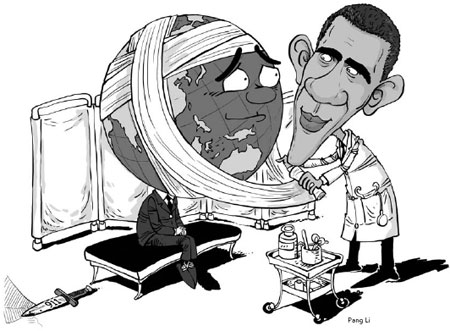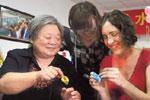Chen Xiangyang
Attack that sowed seeds of new world order
Updated: 2009-09-11 07:46
By Chen Xiangyang (China Daily)
Today is the eighth anniversary of the 9/11 attacks on the US. The past eight years have seen profound changes in the global arena. Among the many events that mark the years is the peaking of American hegemony with the launching of US wars on Afghanistan and Iraq.
The post-Cold War international order has undergone new changes, highlighting the impact of last year's Russia-Georgia conflict, the global financial crisis that originated in the US, and the collective rise of new economic powers. Though considered the starting point of the changes, 9/11 has far-reaching strategic implications.
The 9/11 attacks can be seen as the culmination of serious discontent among Islamic militants, headed by Al-Qaida, with US hegemony and power politics, especially with its pro-Israel policy.
| ||||
The US gained extensive sympathy and support of the international community after the 9/11 attacks, and assumed a high level of morality. Bush, however, abused that sympathy and support to pursue a policy of pre-emption, regime-change and unilateralism on the pretext of fighting terrorism.
The US armed forces first occupied Afghanistan and overthrew the Taliban regime. They then launched a pre-emptive war on Iraq and effected a regime change there, too, accusing Saddam Hussein of amassing weapons of mass destruction and supporting terrorism in violation of UN Security Council resolutions.
That was the peak of US hegemony after the end of the Cold War. But the increasingly fierce opposition to the US forces in the two countries saw the Bush administration embroiled in two long-term conflicts.
Pursuing hegemony and seeking geo-strategic hold in the name of anti-terrorism was a drain on US power and reputation. Even after years of the US war on terrorism, major international terrorist groups continue their vile acts and have even expanded to countries in the Middle East, South Asia and Southeast Asia, which have suffered serious attacks from time to time.
Because of the problems created by Bush both internally and externally, the American people dumped the Republicans and chose Democrat Barack Obama as their new president. After assuming office, Obama began adjusting US foreign policy to have more communication with the Islamic world in order to regain American reputation.
Obama's foreign policy adjustments can be divided into six parts. First, the new US administration began abandoning unilateralism, by paying more attention to the workings of a multilateral and diversified world order, and recognizing the limitations of its own power in the age of globalization. No nation can meet the challenges of the 21st century on its own and the fates of all countries are interdependent, Obama once said.
Second, Obama began changing the US foreign policy to focus on "smart power". Smart power is a concept that balances hard military power with the soft power of diplomacy, development, education and cultural exchanges.

The new US approach requires diplomatic agencies to pay more attention to "listening" and communicating, and even making unofficial contacts with opponents or hostile countries that have no diplomatic ties with America. The Obama administration will conduct more scientific exchanges and allocate more foreign aid to improve its image and win back local as well as the international public's support.
Third, the US has replaced its priority of fighting terrorism with coping with the global (especially American) economic recession because it wants economic recovery and the maintenance of the US dollar's dominance.
Fourth, the Obama administration is trying to play a leading role in major global issues such as climate change, energy and resources security, nuclear-disarmament and network security.
Fifth, it attaches importance to coordination and cooperation among big powers. Apart from enhancing cooperation with its traditional allies, the new government wants to hold more bilateral dialogue and cooperate with emerging countries, such as BRIC (Brazil, Russia, India and China), to jointly meet global challenges.
And finally, the US administration has shifted its anti-terrorist operations from the Middle East to South Asia and is trying to restore (or improve) its relations with the Islamic world. A new Afghanistan-Pakistan policy will see more US troops deployed in Afghanistan and more aid offered to Pakistan to combat terrorism, develop their economies and promote social progress.
The six factors of "systematic change" are a reflection of the "Obama Doctrine", which has pragmatism, change and flexibility as its features and maintaining of the US as the only superpower as its goal.
Considering the profound changes of the past eight years, it is evident that countries that aim to hegemonistic or want to expansionism their area of influence are bound to fail. The two irreversible historical trends are multi-polarization of the world order with the rise of new economic powers, and the use of the meeting table to deal with global affairs through equal consultations. The past eight years also show that double standards applied in the name of fighting terrorism will fail, and hence should be opposed, and that global issues, including terrorism, need more global cooperation to resolve, and the cooperation ought to suit the economic and social status of the concerned countries.
The author is an associate researcher at the Institute of World Politics, China Institute of Contemporary International Relations.
(China Daily 09/11/2009 page9)
Specials

China dream
Popular Bluff, Missouri, native Catherine Beck never imagined her summer experiences in China would change her career course.



